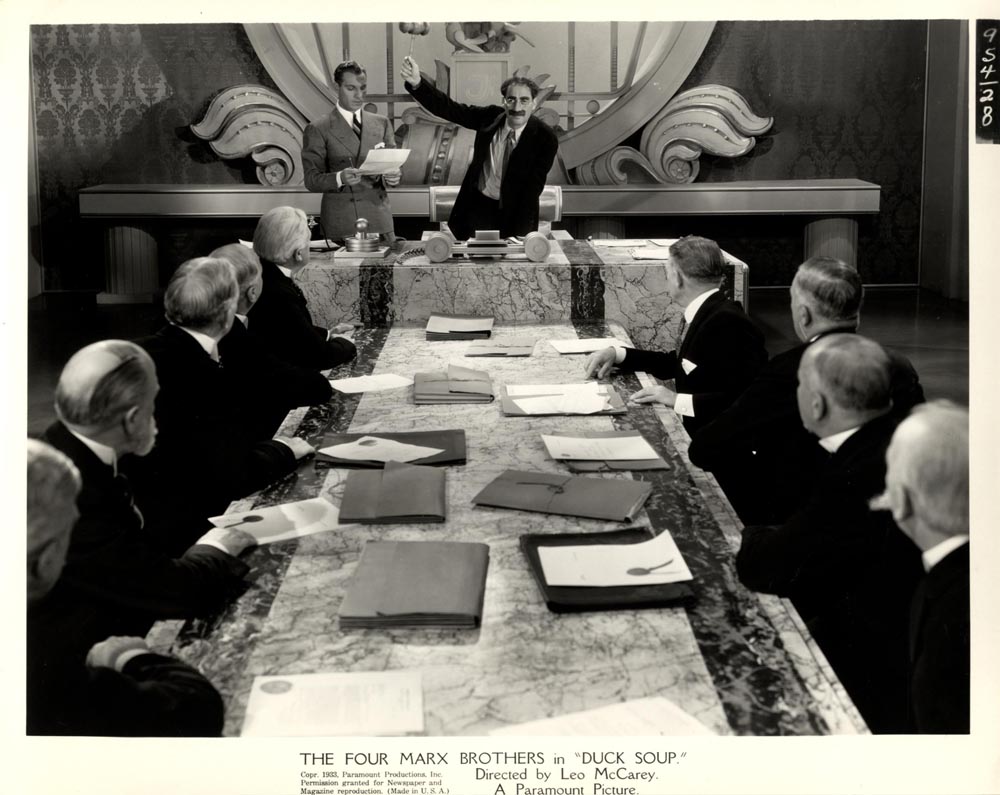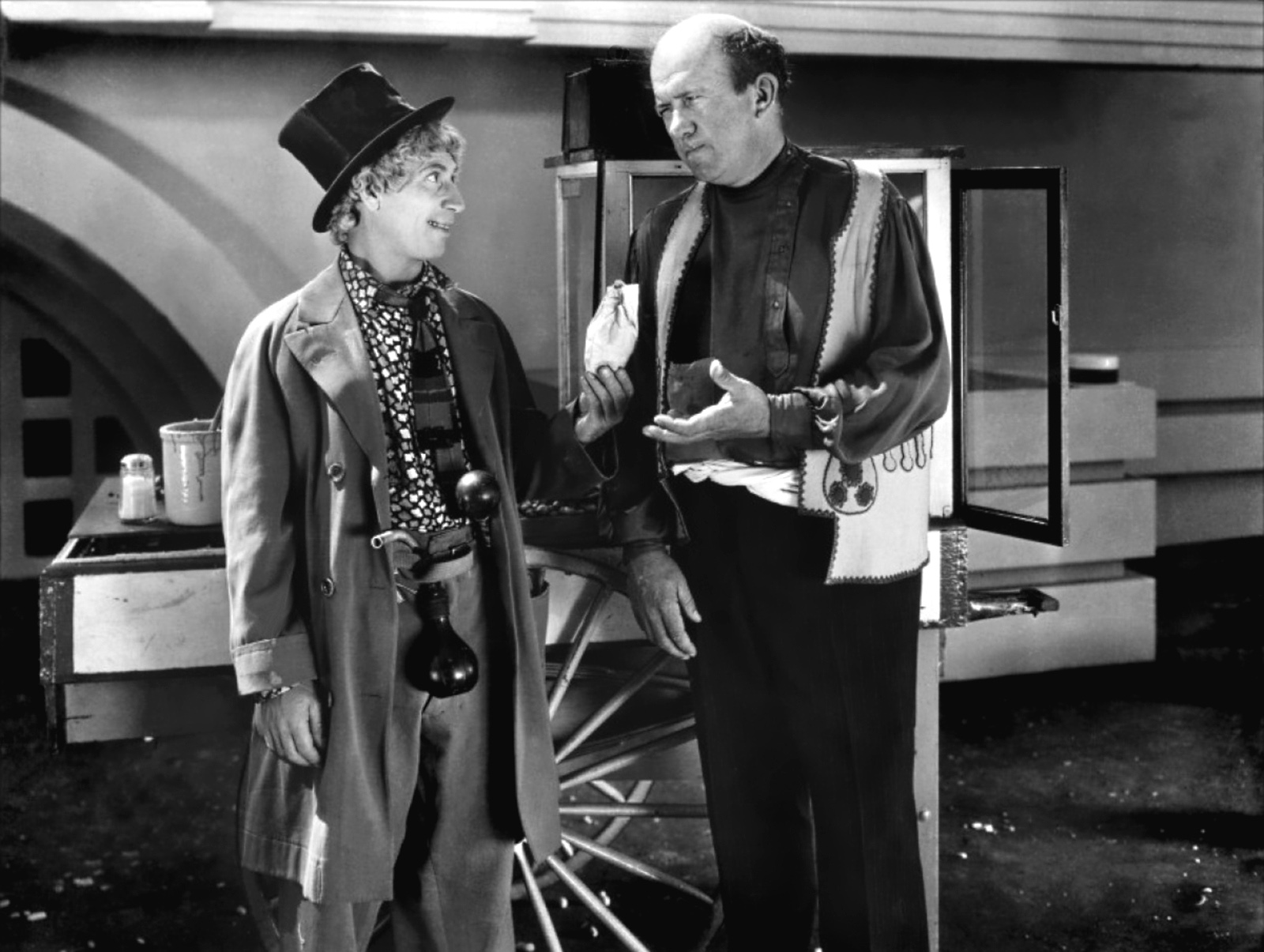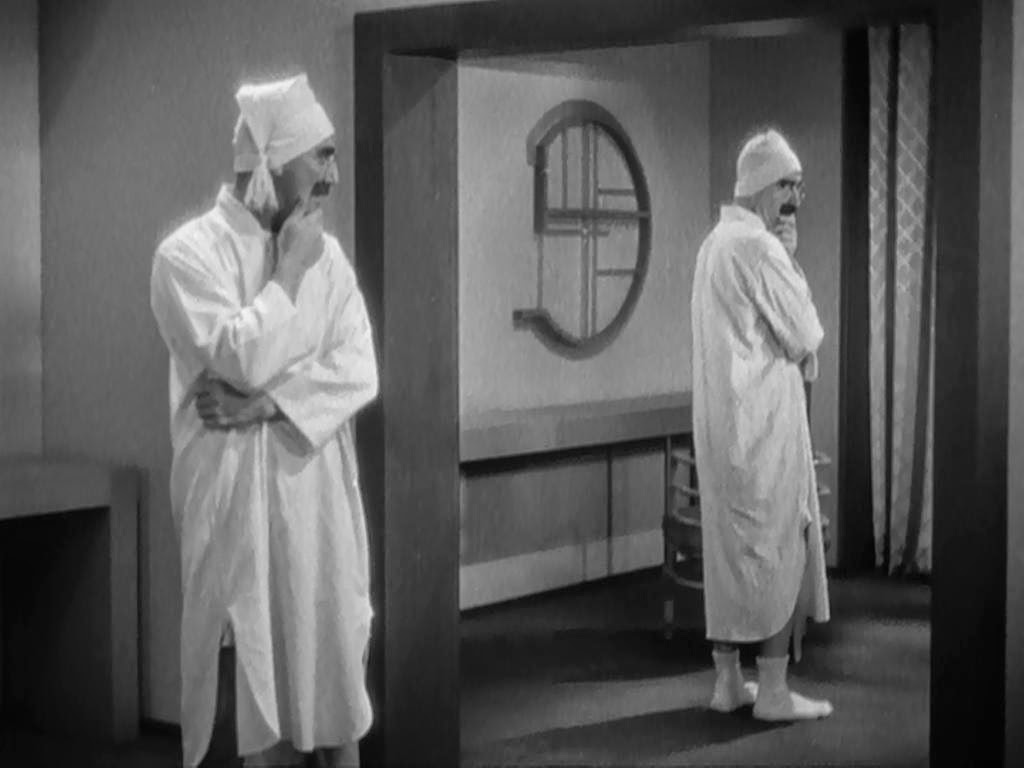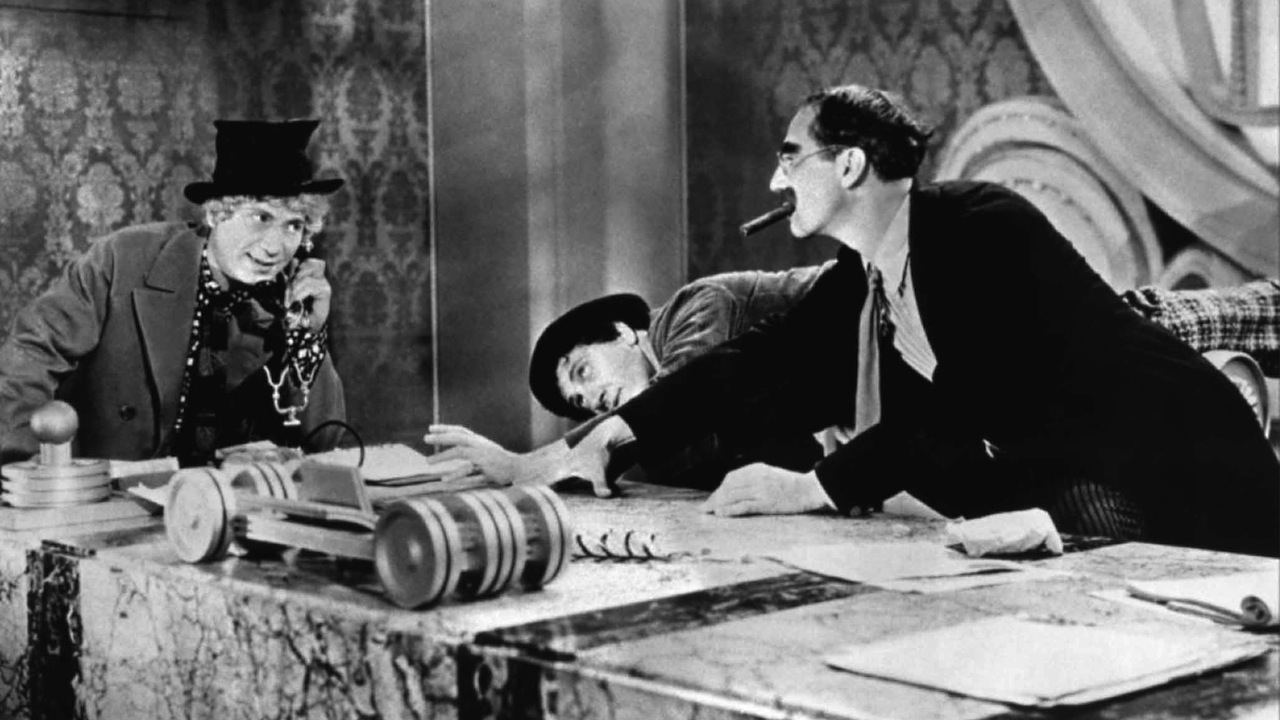“I got a good mind to join a club and beat you over the head with it.” So says Groucho at one point in Duck Soup, in a pun that doubles as a summary of the film’s approach.
Duck Soup was the final film the brothers made for Paramount, a bridge-burning coda to their time there. It flopped, of course, only to be recuperated generations later and elevated to a level of respect and admiration that must’ve made them giggle. This is not a respectable film.
Combining their background in vaudeville with Groucho’s nonstop idiot patter, Duck Soup is an affront to respectability and seriousness, which makes its canonization that much goofier. High-minded critics tend to find in it a Dadaist sensibility, an absurdist take on the trappings of power. Here, in a film in which a tony ambassador angrily declares, “I didn’t come here to be insulted!” and Groucho responds, “That’s what you think.”

Duck Soup, a film in which Groucho is inexplicably brought in to head up the fictional country of Fredonia, would seem to be the closest the troupe got to outright political satire, and much of the esteem that’s been heaped upon it stems from that. But all these attempts to turn the Marx Brothers into political avatars are undermined by their own comedy. “I’d never join a club,” Groucho famously remarked, “that would have me as a member.”
Instead, we are treated to an almost punishing collection of dad jokes, with some interminable physical comedy gumming up the works. This is a film more fondly remembered than watched.
The best things about Duck Soup all arise from Groucho’s wordplay — an almost endless list. In less than an hour and a half, I’m not sure the man has a line that isn’t a double entendre. And he has a lot of lines.
Well, that covers a lot of ground. Say, you cover a lot of ground yourself. You better beat it – I hear they’re going to tear you down and put up an office building where you’re standing. You can leave in a taxi. If you can’t get a taxi, you can leave in a huff. If that’s too soon, you can leave in a minute and a huff. You know, you haven’t stopped talking since I came here? You must have been vaccinated with a phonograph needle.
Meanwhile, his character, the wonderfully-named Rufus T. Firefly, hires Chico to be his Secretary of War, despite (or perhaps because) he’s a peanut vendor. Chico and Harpo are actually double agents, working for the country of Sylvania. We encounter them, as Craig Brown notes, as human puns:
When Harpo next appears, he is with Chico. They arrive at the Ambassador’s door as his appointed spies, both wearing bearded masks and hats, with Harpo’s eyes whirling round on springs. But the mask itself is then unmasked: Chico turns Harpo round; his real face is on the other side of his head.
It’s a decent gag, but it underscores the larger point: this is Groucho’s film, and everyone else just weighs it down. The long, nearly silent segments in which Chico and Harpo mess with a lemonade salesman are a tribute to their vaudevillian lineage.
They are also totally unfunny. The contrast between sharp wordplay and wordless hijinks is evident, and the physical goofballery loses out. Perhaps contemporary audiences found it rib-ticklingly hilarious, but it’s difficult to imagine almost anyone now agreeing.

So why do so many people maintain, against all available evidence, that Duck Soup is the pinnacle of the Marx Brothers’ output? For one thing, it’s received wisdom: they heard Roger Ebert say so once. For another, the film marks the moment before the transition to MGM, when the brothers would be relegated to bit parts in their own films, wacky characters dancing around love stories in which they were not involved. It’s a last hurrah.
None of which is to say it’s bad. Quite the opposite — Duck Soup is frequently hilarious, at least when Groucho is talking. (I mean, Harpo doesn’t even get to play a harp. What is that.)
There is absolutely a strain of anti-authoritarian anger that runs through the film, barely coded. (“You’re a brave man. Go and break through the lines. And remember, while you’re out there risking your life and limb through shot and shell, we’ll be in be in here thinking what a sucker you are.”)
On rewatching, I’m reminded more than anything of the dinner table sequence in Gravity’s Rainbow, where our declasse heroes make their rich hosts vomit with gross alliterations at their fancy meal: Smegma Stew! Menstrual Marmalade! Clot Casserole! This is the level on which Duck Soup plays.
 There are great physical bits, particularly the famous mirror scene, in which Groucho and Harpo (dressed as Groucho) mimic each other. In just a few short minutes, the film engenders an entire trope that will be carried through cartoons for the rest of time. There’s also something oddly touching about it: you can feel the staginess and yet you don’t care. The gag is too good to care.
There are great physical bits, particularly the famous mirror scene, in which Groucho and Harpo (dressed as Groucho) mimic each other. In just a few short minutes, the film engenders an entire trope that will be carried through cartoons for the rest of time. There’s also something oddly touching about it: you can feel the staginess and yet you don’t care. The gag is too good to care.
As far as I’m concerned, digging into a Marx Brothers film is a fool’s errand. They were, and are, meant to entertain. The ultimate goal is a giggle, not an essay. Duck Soup (Groucho explaining: “Take two turkeys, one goose, four cabbages, but no duck, and mix them together. After one taste, you’ll duck soup the rest of your life.”) was never meant to occupy some sort of breathless, rarefied place in cinema history. It was supposed to make you laugh.
It mostly still does.
My father loved the Marx Brothers above all other comedians or, indeed, all other movie stars. The first movie he ever took me to was “A Day at the Races.” All I remember about that experience was the fact of my father’s laughter. But there was something else, too, that I understood only much later: The sound of his voice as he described the brothers. He used the tone that people employ when they are talking about how someone got away with something.
That is the same tone I have heard, and used, in discussing such subjects as “Some Like It Hot,” “The Producers,” “Blazing Saddles,” “Airplane!,” Monty Python, Andy Kaufman, Saturday Night Live, “South Park,” Howard Stern, “There’s Something About Mary” and “Being John Malkovich” — and even movies that are only indirectly comedies, like “Pulp Fiction.” There is a kind of admiration for material that dares something against the rules and yet is obvious, irresistibly, funny. How much more anarchic the Marx Brothers must have seemed in their time than we can understand today. They were among the first to evoke that tone; you can see who the Marx Brothers inspired, but not who they were inspired by, except indirectly by the rich traditions of music hall, vaudeville and Yiddish comedy that nurtured them.

